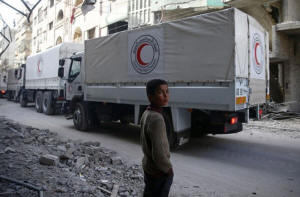|
Bombardment of Syria's Ghouta endangers
aid convoy: U.N.
 Send a link to a friend
Send a link to a friend
 [March 09, 2018]
BEIRUT (Reuters) - An emergency aid
delivery crossed front lines into the besieged rebel enclave of eastern
Ghouta on Friday but ran quickly into danger from renewed shelling, the
top U.N. official in Syria said, amid a fierce government offensive. [March 09, 2018]
BEIRUT (Reuters) - An emergency aid
delivery crossed front lines into the besieged rebel enclave of eastern
Ghouta on Friday but ran quickly into danger from renewed shelling, the
top U.N. official in Syria said, amid a fierce government offensive.
The convoy was carrying food that could not be offloaded on Monday when
fighting forced an earlier delivery to leave early, and the latest
shelling came despite safety assurances, U.N. resident coordinator Ali
al-Za'tari said.
In less than two weeks, the Syrian army has retaken nearly all the
farmland in eastern Ghouta under cover of near ceaseless shelling and
air strikes, leaving only a dense sprawl of towns - about half the
territory - still under insurgent control.
The onslaught has killed more than 1,000 people, the medical charity
Medecins Sans Frontieres (MSF) said on Thursday. The war monitor, the
Syrian Observatory for Human Rights, on Friday gave a death toll of 940
civilians in the campaign.
For eastern Ghouta's civilians, trapped in underground shelters but
deprived of food and water, there is a constant dilemma - whether to
seek supplies or stay inside.

"People were hopeful after the bombardment decreased and went out onto
the streets. But then air strikes began again, and there are still
people under the rubble that we couldn't get out," said Moayad al-Hafi,
a man in the town of Saqba.
Damascus and Moscow have both said the assault is needed to stop rebel
shelling of the nearby capital Damascus and end the rule of Islamist
insurgents over civilians in eastern Ghouta.
But U.N. human rights chief Zeid Ra'ad al-Hussein has said, in comments
criticized by Syria's government, that the assault was "legally, and
morally, unsustainable".
The Observatory said there had been no air strikes on eastern Ghouta's
towns overnight for the first time since the government ground offensive
began around 10 days ago.
But soon after the convoy of 13 trucks carrying food parcels crossed
into eastern Ghouta, the Observatory and a witness in Douma said air
strikes had resumed.
The shelling came "despite assurances of safety from parties including
the Russian Federation", said Za'tari, calling for a cessation of
hostilities in the area and calm throughout Syria so that emergency aid
could be safely delivered.
A Douma resident, in a voice message over which the sounds of loud
explosions were audible, said four jets were in the sky and residential
areas had come under air attack.
The food parcels were supposed to be delivered on Monday when another
aid convoy entered Douma, but the fighting and bombardment then forced
it to leave early without unloading all its supplies.
Defeat in eastern Ghouta would deal the rebels their biggest blow since
the fall of Aleppo - Syria's second city - in December 2016 by forcing
them from their only significant stronghold left near Syria's capital.

For President Bashar al-Assad, it would mark a significant victory as he
builds on the military momentum created by Russia's entry into the war
in 2015 that has restored his rule over large swathes of the country.
In many cases, rebel enclaves have surrendered to the government in
deals that allowed insurgents and their families, along with any other
civilians who did not wish to stay under Assad's rule, to depart for
other opposition areas.
[to top of second column]
|

A boy stands as an aid convoy of Syrian Arab Red Crescent drives
through the besieged town of Douma, Eastern Ghouta, Damascus, Syria
March 5, 2018. REUTERS/Bassam Khabieh

"ONE MEAL IN SEVERAL DAYS"
"The situation is relatively good today. The bombing eased for a bit and
is no longer intense," said Bilal Abu Salah, a resident of Douma, before
the resumption of air strikes. But he added that shortages remain acute,
causing great hardship.
"Entire families eat one meal in several days," he said.
U.N. aid agencies have pleaded with the Syrian government and its ally
Russia to halt the campaign and allow access for humanitarian
deliveries.
The United Nations estimates that 400,000 people live in rebel-held
areas of eastern Ghouta. The government and Russia's military have
opened what they say are safe routes out of the enclave, but no
inhabitants are known to have left yet.
Damascus and Moscow accuse the insurgents of shooting at civilians to
prevent them fleeing the fighting into government areas. Rebels deny
this and say the area's inhabitants have not crossed into government
territory because they fear persecution.
The terror of the bombardment and the increasingly unbearable living
conditions may push people to brave the fighting and flee, according to
one resident of Douma.
"They are putting pressure on the civilians and luring them out (of
eastern Ghouta)... I don't want to leave, but I don't want any harm to
happen to my family," said Abu Ahmad al-Ghoutani, who said he has two
children.

Medical facilities have been hit in air strikes, adding to shortages of
equipment that have made it harder to treat the wounded. On Friday the
World Health Organization said attacks on medical facilities in Syria
were on the rise.
Assad's offensive has come close to splitting the enclave in two,
effectively separating its two halves by bringing the narrow strip
between them under fire, a commander in the alliance supporting Assad
said on Thursday. Rebels deny that.
Tens of thousands of people have fled further into the enclave in the
face of the warfare, a U.N. official said on Thursday, and residents of
Douma said shelters are crowded with the new arrivals.
State television reported on Friday morning that the army had control
over the village of Beit Sawa, where rebel officials on Thursday said
insurgents had recaptured some positions. Government forces will now
advance along other fronts, it said.
(Reporting by Ellen Francis and Dahlia Nehme in Beirut, Kinda Makieh in
Damascus and Stephanie Nebehay in Geneva, writing by Angus McDowall,
editing by Mark Heinrich)
[© 2018 Thomson Reuters. All rights
reserved.]
Copyright 2018 Reuters. All rights reserved. This material may not be published,
broadcast, rewritten or redistributed.
Thompson Reuters is solely responsible for this content. |